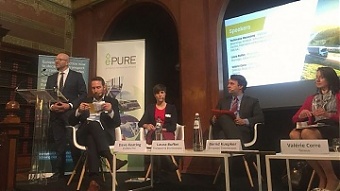Ecology, Energy, Energy Market, EU – Baltic States, Transport
International Internet Magazine. Baltic States news & analytics
Wednesday, 07.01.2026, 13:37
With new regulation complete, what’s next for EU biofuels?
 Print version
Print versionHe was, of course, not saying that the phenomenon of Indirect Land Use Change has been solved. He was instead making the point that after years of legislative battles over how to deal with it, the European Union has finally agreed on a new regulatory regime to stop incentivising such land use change.
However, not everyone at the event agreed.
Since 2008, the EU has had a target for member states to source 10% of their transport fuel from renewable sources by 2020. At the time it was assumed this would come from vehicles switching to biofuels, and the targets spurred rapid growth in the sector.
But soon after, campaigners said the increase in biofuel production was causing land to be used differently (ILUC) in a way that was displacing food crops and causing more emissions than the biofuels abated. The tide turned against biofuels.
But many in the sector complained that all biofuels were unfairly being tarnished with the same brush. Yes, some biofuels, such as palm oil, were driving ILUC. But other greener biofuels, such as renewable ethanol and second generation fuels from algae, were not, they said.
The biggest problem was that the EU was slow to act in those early years. For the last ten years, there has been uncertainty hanging over the sector which has stifled investment.
But in March, new sustainability criteria for biofuels counting toward the EU targets were approved – marking the final hurdle for putting in place a new regulatory regime for EU renewable transport. It was the final step in a reform of the EU’s renewable transport laws which capped the use of crop-based biofuels in 2015.
Fresh start
 |
|---|
| Foto EURACTIV.com |
This week, with the new regulation finally in place and new lawmakers coming to Brussels following the European Parliament elections, stakeholders gathered at a EURACTIV event sponsored by renewable ethanol association ePure, asking what comes next.
Has the now-completed regulatory reform stopped the EU targets from incentivising ILUC? Kuepker said he believes yes. Valérie Corre, regulatory affairs director at French bioethanol producer Tereos, agreed.
She said that while she had concerns about the first iteration of the Commission’s proposal, member states had added the necessary flexibility to make sure good biofuels could survive. As a European producer, she added, Tereos was at first concerned that the legislation would penalise European sources of biofuel.
“European feedstock is not the problem,” she said.
However, Laura Buffet from the NGO Transport & Environment did not agree that the EU’s regulatory revision solves the ILUC problem. “We want the EU to phase out biofuels,” she said, pointing to a recent report showing CO2 emissions from ILUC are still rising.
While the regulatory changes will be helpful because EU member states will no longer be forced to use crop-based biofuels, the share of advanced biofuels in the market is still negligible.
The new regime specifies that only 7% of the 10% renewable transport target can be met by biofuel that has been shown to displace food crops or cause ILUC. It also sets incentives for the use of advanced biofuels.
Buffet said what will really matter is the implementation of the new rules and so far developments have not been promising. “ILUC accounting is still not happening,” she said.
Martin Pitorák, third secretary for energy policy at Slovakia’s Permanent Representation to the EU, said he thought the regulatory clarity will help boost European feedstock for biofuel, which he also said has a low risk of causing ILUC.
Recently, Slovakia, Poland and the Czech Republic signed a joint declaration urging the EU to do more to spur development of locally produced clean biofuels, which they say will both reduce transport emissions and boost rural areas and farmers.
The panellists also discussed transport electrification, one of the big buzzwords in Brussels these days. Asked whether the electrification of transport, in the form of electric vehicles, is going to be competing with cars operating on biofuel, Carre said no.
But she said the benefits of biofuels should be greater promoted, and expressed frustration that the emissions from electric vehicles are only being measured at the tailpipe, and not for the entire life-cycle of the vehicle and the electricity. That electricity is still being generated by fossil fuels, she pointed out.
Buffet said that electrification is the preferred approach for T&E because the rewards are greater and it allows a more systemic approach. Kuepker said that the Commission wants to remain technology neutral, and a range of solutions will be needed. There is, he said, no silver bullet.
Toshimasa Masayama, an analyst with the International Renewable Energy Agency (IRENA), agreed that there is no silver bullet and biofuels and electric vehicles don’t need to be in competition.
But, he said, biofuels can present a faster solution in the short term. It can take two decades for electric vehicles to be widespread in the market, he said, while biofuels can be used right away.
In the end, all the panellists agreed that the newly achieved regulatory certainty on biofuels is a welcome development.
Now, as the EU’s new lawmakers in the European Parliament and European Council come to Brussels over the next several months, the various stakeholders will be keen to impress upon them the importance of their particular pathway to transport decarbonisation.
With the regulatory uncertainty over biofuels now cleared, it will be easier to properly assess the various pathways available.








 «The Baltic Course» Is Sold and Stays in Business!
«The Baltic Course» Is Sold and Stays in Business!

